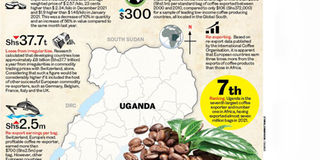Prime
Uganda’s withdrawal from ICA: Storm in a coffee cup

What you need to know:
Uganda Coffee Development Authority ended Uganda’s participation in the multilateral organisation as of February 1, 2022
Uganda’s withdrawal from the International Coffee Agreement (ICA) 2007 earlier this month brought to a halt a relationship that some stakeholders in the Ugandan coffee sector describe as predatory.
When Uganda became a signatory to the agreement 15 years ago, a string of benefits were mentioned. They ranged from international representation, responding to members’ requests to address the coffee price crisis and facilitating discussions on topics related to finance and risk management in the coffee sector.
There was particular emphasis on the needs of small- and medium-scale producers, and local communities in coffee-producing areas.
The benefits further proved that this was hardly a raw deal.
They included providing opportunities for networking, access to information and analysis, regular statistical publications of the International Coffee Organisation (ICO) Indicator Price and promoting coffee consumption, as well as assisting in the development and funding of coffee development projects.
Things soured along the way, culminating in the Uganda Coffee Development Authority’s (UCDA) decision to bring an end to Uganda’s participation in the multilateral organisation as of February 1, 2022.
The UCDA insists that concerns pertaining to high tariffs on processed coffee imposed by developed/importing countries cannot be wished away. The government agency—which oversees the affairs of the coffee industry—further charges that the current deal disadvantages coffee producing countries such as Uganda, resulting in farmers getting low prices
The issues
In fact, the UCDA top brass believes that the Shs143m annual membership subscription fees can be better deployed in the development of the domestic coffee value chain.
The UCDA officials believe Uganda needs unconditional market access that allows for export of value-added coffee, not only green coffee.
The UCDA also strongly believes the ICO can do a better job insulating players in the coffee value chain from coffee price volatility.
A lopsided classification—which only lists Brazilian and Colombian types of coffee and relegates the rest to an “others” category—also has proven deeply offensive given the quality of Uganda’s coffee beans.
To compound the matter, the ICO indicator prices—often used by coffee buyers as a benchmark—reportedly have no sound statistical basis.
If anything, the UCDA says they work to the detriment of Robusta coffee producers.
Add to all this, the “small matter” of ICO not focusing on programmes that have the potential to benefit coffee producing countries and you have a combustible situation.
The UCDA says more than 70 percent of funds contributed by members are spent on consumptive things such as staff emoluments and administrative costs.
To top things up, the UCDA says since 2012—when the Common Fund for Commodities stopped funding ICO member countries’ projects—member countries have requested an alternative to help them address challenges such as climate change, low production and productivity, pests and diseases and price volatility. This has, however, been in vain.
Rebuttal
In a statement released this past week, the ICO held that Uganda would be better served staying in the current ICA.
It further urged the UCDA to participate in the drafting of the new agreement based on its interests and in a true spirit of multilateralism that has always guided the participation of Uganda in international forums.
“You cannot claim your share of the meal while you are not at the dinner table,” reads part of the statement, quoting an African proverb.
The ICO was also keen to show that the meal it was serving is worth the while. It pointed out that exporting members of the ICO still represent 93 percent of world coffee production and 64 percent of consumption for good measure.
Saturday Monitor can reveal that since receiving notification from the UCDA, the ICO and the chair of the International Coffee Council (ICC) have made several attempts to engage Ugandan authorities.
President Museveni is among the top officials it has unsuccessfully tried to seek audience with.
Prof Victoria Sekitoleko, a former Agriculture minister, supports Uganda’s hard stance.
“This is long overdue. It should have been done so many years ago,” she says, adding that there is nothing in the mandate of the ICO that Uganda will be deprived of following its decision to leave the multilateral organisation.
Experts weigh in
Mr Tony Mugoya, the executive director of Uganda Coffee Farmers Alliance, is circumspect.
He says: “We are yet to see if other certificates of origin issued by UCDA and other organisations such as Common Market for Eastern and Southern Africa (Comesa), and East African Community will be recognised internationally. If they’re rejected, then there will be definitely far reaching implications on coffee commodities that we produce.”
He adds: “Some producers had a running contract where the ICO certificates of origin was part of the basis upon which the deal was inked. So I can see a situation where some players will have to renegotiate their contracts.”
Mr Mugoya is, however, not losing sleep because Uganda’s coffee is irresistible.
The fact that heavy producers such as Brazil—who contribute 40 percent of global production—are having production challenges only strengthens Uganda’s hand.
Tonny Odokonyero, a researcher at Economic Policy Research Centre (EPRC), believes that while the withdrawal was inevitable because of the historical asymmetries that “undermine coffee value addition efforts”; it will come with some downsides.
“The ICO market is dominant, accounting for more than 60 percent of global coffee consumption. This implies a significant loss of potential market for Ugandan coffee,” he admits, adding: “This will certainly affect Uganda’s export revenue negatively. It will cost Uganda to start building similar alternative markets if the withdrawal is maintained.”
Odokonyero also believes the ICO’s services such as the coffee quality improvement and income diversification initiatives will be sorely missed.





